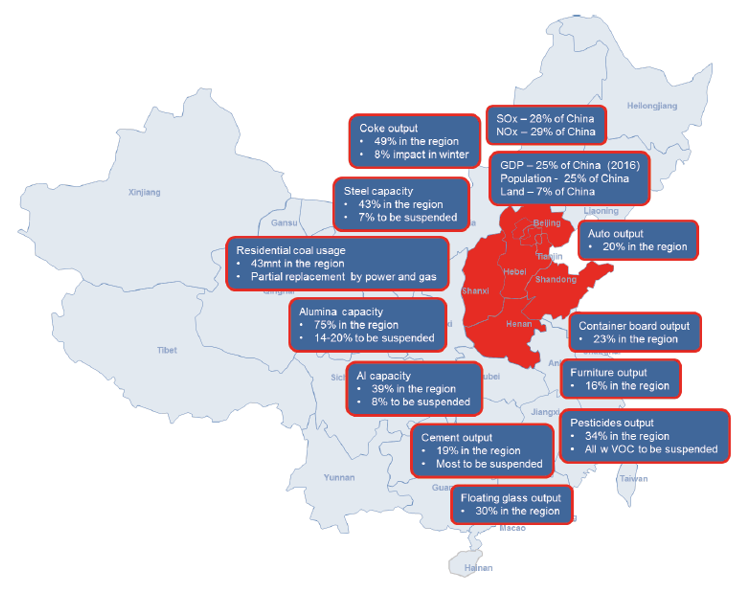From freezing the bubble to a beautiful China
My recent visit to China highlighted three key themes: Firstly, the environmental crackdown, including the winter shutdown of dirty industries across the northern cities, will be felt globally. China’s air quality target requires a 50–70% reduction in annual emissions —a journey that may last more than a decade. Secondly, the Government continues to place restrictions on property, which is making it harder to transact. Further, it is pivoting to increase rental properties. And finally, China has suddenly gone from having a surplus in liquefied natural gas (LNG) to having a deficit and this is expected to be an ongoing thematic as both industry and residential move away from coal as a source of heat/energy.
Fire and Ice: The Winter Shutdown and Crackdown on Emissions
A flying visit into China post the 19th Party Congress seemed like a good idea. I got the sense that post the conference, visibility and direction over the next five years was reasonably clear. But it is more difficult to hold a similar view for 2018.
The party working groups are currently designing more detailed economic plans that will follow the direction provided by the Party Congress. Short-term data clearly shows the Government is slowing the economy with a primary objective to transition from fast growth to high quality growth. The Government will achieve this higher quality growth by evaluating local governments on the basis of efficiency (or ‘total factor productivity’ TFP) rather than the traditional GDP.
Despite the skies being blue, the air smelling clean, and share bikes everywhere, the air quality was many times over the safe levels one expects in Western cities. Nevertheless, there was a noticeable improvement in air quality, which should encourage winter cuts in 2018.
The political aspiration of the Chinese Government is to reduce annual emissions by 50–70%. This target is likely to take 10+ years and will result in profound changes to the industrial China we know and understand today.
Unlike the apparent one-off 276-day rule for coal, implemented by the National Development and Reform Commission (NDRC) to cap production to increase coal prices, the winter shutdowns that started in mid-November 2017 are here to stay and will likely expand. In 2018, steel mills and coke ovens will be shut down at various levels across 26 + 2 cities in China’s central northern regions around Beijing.
'26 + 2' Cities — A Politically and Economically Important Region
The winter shutdown, which began in September and will run until March, is President’s Xi’s attempt to avoid pollution-related social unrest by prioritising environmental protection. This is a continuation of the action plan started in 2013, which has seen 24,000 officials punished and 27,000 polluting companies fined.
Figure 1: The Pollution Transition Zone

Source: China Ministry of Environmental Protection, Goldman Sachs.
The plan aims to cut average PM2.5 (particulate matter <2.5 micrometers) concentration and days of heavy pollution by at least 15% YoY for the 26 cities (plus Beijing and Tianjin) that are located along the ‘pollutant transmission zone’.
Goldman Sachs estimates that the region generates 25% of China’s GDP and around 28% of the annual pollutant emission, yet makes up only 7% of the land in China.

